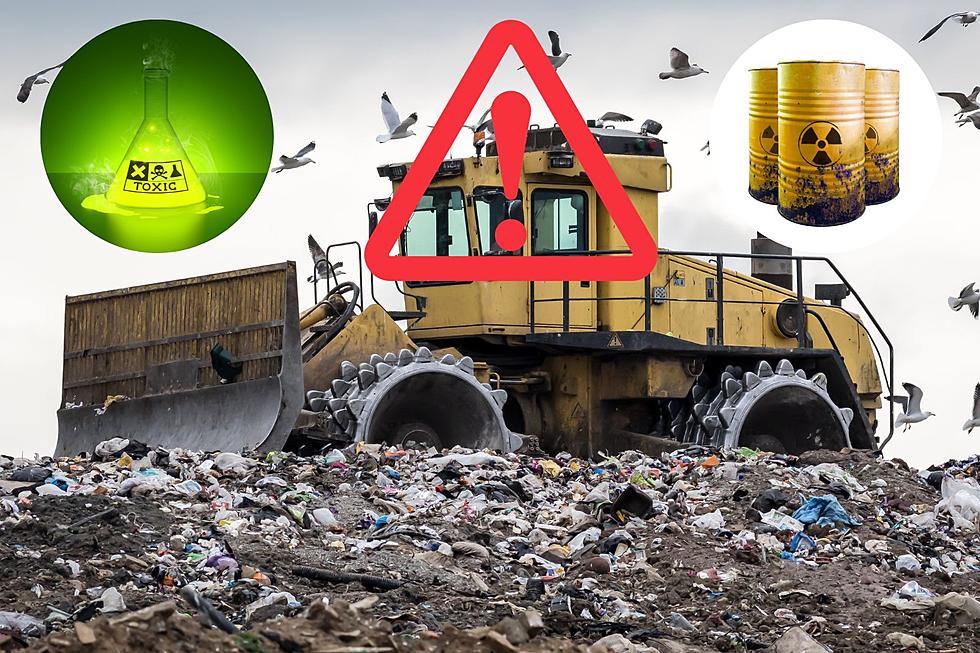
These 14 Strange Items Are Prohibited In Michigan’s Landfills
Michigan has over 400 landfill facilities throughout the state. Landfills are where our residential and commercial trash go after the trash leaves our property. Are you throwing away items that the landfill will not accept?
I used to throw everything in the trash when I was done with it. I realized one day that when the trash guy sees something that is not accepted at the landfill they will move onto the next house. That's when I realized that landfills probably don't take everything. Certainly not toxic stuff.
Things like chemicals seem like common sense, throwing away paint isn't a good idea. What about paint thinners and other abrasive chemicals. That kind of material could cause issues with groundwater etc., right?. Let's look at the 14 items not accepted at Michigan landfills and the reasons why. Although our time on the planet is brief, we should pay better attention to what we are throwing away. Our kids and our grandchildren still have a lot of life to live.
14 Items Michigan Landfills Will Not Accept
Asbestos
The state of Michigan:
Asbestos demolition, waste handling, and disposal are subject to a federal National Emission Standard for Hazardous Air Pollutants (NESHAP). The Michigan Department of Environment, Great Lakes, and Energy (EGLE) Air Quality Division (AQD) implements the asbestos NESHAP program in Michigan. Landfills and abatement contractors must have provisions in place to meet the NESHAP. To determine if a landfill accepts asbestos, including how to prepare and ship it, contact the landfill.
Beverage Containers
The state says:
If a deposit was paid on a beverage container, return it to any retailer that sells the beverage or recycle it through your local recycling program. If no deposit was paid, recycle it through your local recycling program where possible.
Yard Clippings
Michigan says:
Yard clippings such as grass, leaves, sticks, and landscape trimmings should be composted onsite or taken to a composting facility. Only yard clippings that are diseased, infested, or part of an invasive species control program can be landfilled. Check with your city, township, or trash vendor to see if they collect these materials.
Empty Drums
Michigan's stance:
Drums must be either full of solid waste or be crushed to be disposed of in a solid waste landfill.
Hazardous Waste
Michigan chimes in:
Most hazardous waste from businesses and institutions must be taken to a licensed hazardous waste management facility. Hazardous waste management facilities are subject to additional requirements and licensed separately from solid waste landfills. Household hazardous waste, such as solvents, cleansers, and pesticides are not prohibited from landfills. However, they are not well suited for solid waste disposal either. As a result, waste haulers, solid waste receiving facilities, and some municipalities may have special guidelines for disposal of household hazardous waste.
Bulk Liquids
Michigan says:
Bulk liquids from businesses and institutions must be solidified before they can lawfully be disposed in solid waste landfills. Often liquids can be recycled too.
Lead Acid Batteries
Michigan's take:
Lead acid batteries can generally be recycled through the retailer or auto repair shop that sells the new battery.
Low Level Radioactive Waste
Michigan says:
Low-level radioactive waste includes items contaminated with radioactive materials or that have become radioactive through exposure to neutron radiation. Generally, these are generated from nuclear power generation, healthcare services, and research and development activities.
Medical Waste
Michigan's looking out:
Medical waste from businesses and institutions must be managed to meet Michigan’s Public Health Code to prevent infection and disease hazards. Prior to disposal in solid waste landfills, medical waste must be packaged and labeled in accordance with Part 138 of Michigan’s Public Health Code, and treated by autoclave, incineration, or disposed of via an alternative treatment method approved by EGLE. Although needles and lancets generated by residents are not prohibited from landfill disposal, like household hazardous waste and bulk liquids, they are not ideal for solid waste disposal. Waste haulers and solid waste receiving facilities may have special guidelines for disposal these items.
Polychlorinated Piphenyl Waste
These chemicals are toxic and Michigan says:
PCBs containing waste materials are subject to the Toxic Substances Control Act, which is implemented in Michigan by the U.S. Environmental Protection Agency (U.S. EPA). Contact the landfill to see if they accept PCB wastes and verify their information with the U.S. EPA by calling 312-886-7890.
Scrap Tires
Michigan says:
Scrap tires should be recycled where possible. A landfill may accept tires for disposal if they are cut in half or otherwise processed by shredding, cutting, or chipping.
Septage
Michigan says:
Septage includes domestic wastewaters removed from on-site septic systems, cesspools, treatment works, sewer clean-outs, portable toilets, and marine sanitation devices AND food establishment wastewaters from grease interceptors that are mixed with 3 parts septage. Septage handling, transport, and disposal are overseen by EGLE’s Drinking Water and Environmental Health Division.
Technically Enhanced Naturally Occurring Radioactive Materials
Michigan's take:
TENORM includes items and materials whose concentrations of naturally occurring radioactive material have become elevated through human activity. Common activities that may produce TENORM are oil and gas production, minerals extraction, and water treatment.
Used Oil
Michigan says:
Used oil must be recycled in Michigan. Oil change locations often accept used oil from residents if it is not mixed with other liquids.
